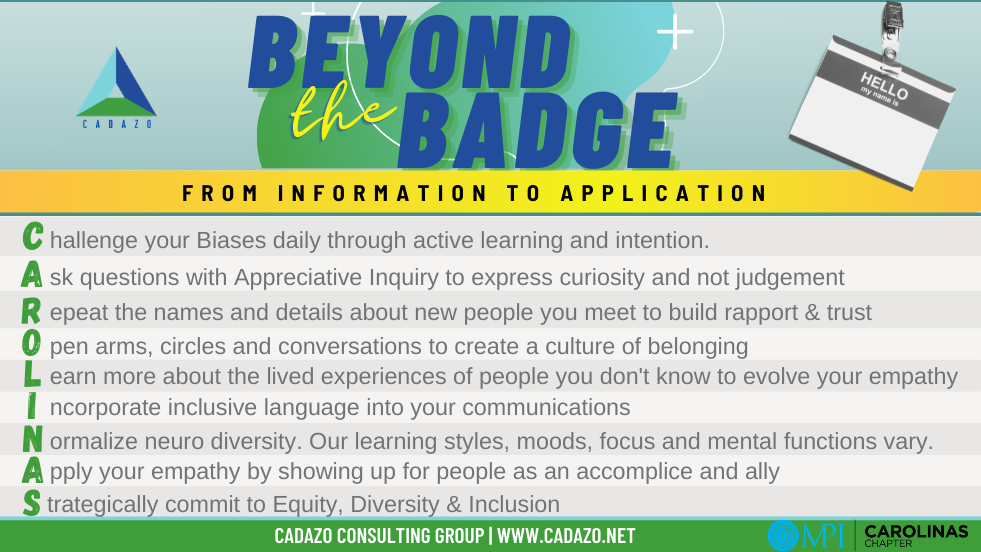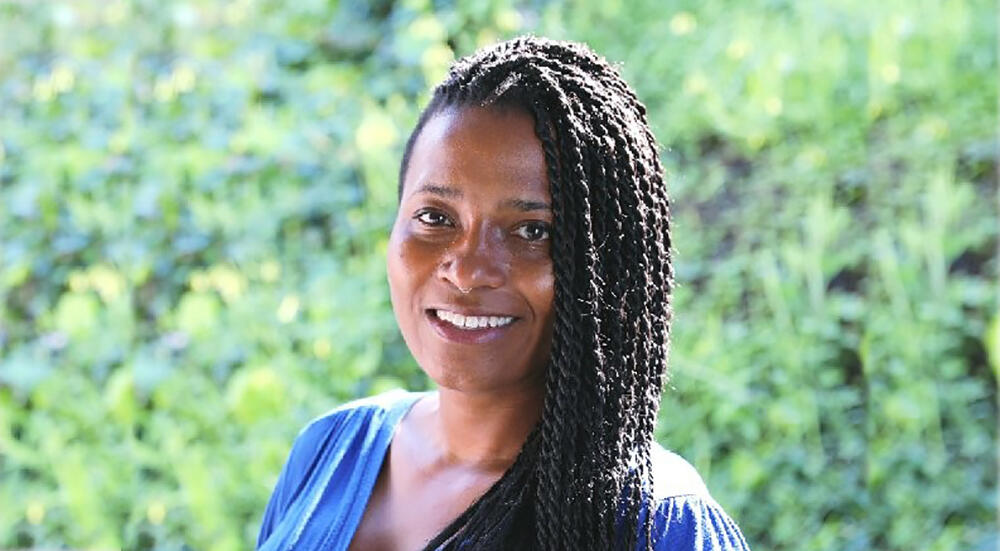February 26, 2026
Join MPI Carolinas for our Planner Partner Forum!
Register Now!
The Evolution of Empathy

(Focused on challenging biases that influence implementing EDI initiatives in the hospitality, meetings and events industry)
Ask a room full of people about their biases towards individuals who don’t share the same social identity and perspectives as they do and they’ll more than likely raise their hands to identify themselves as being extremely patient with no biases. The response is typical but dishonest.
To comfortably admit personal biases the journey begins with a personal commitment to Social Emotional Learning (SEL) and comprehending commonly used terminology. Everyone has biases whether unconscious, implicit or explicit and by valuing the five components of SEL:
- Self-Awareness
- Self-Management
- Responsible Decision-Making
- Social Awareness
- Relationship Skills
We recognize that vulnerability provides space for genuine discussions that will unveil truths about our beliefs, thoughts, perspectives and attitudes.
Defining Biases
The deepest biases, emotions, beliefs, urges, memories and thoughts processed at a level of the mind which is beyond conscious awareness are referred to as unconscious biases.
Expressed behaviors, attitudes, thoughts, actions that are implied but not communicated effectively or directly are known as implicit biases.
Prejudice, discrimination and opposition directed at a particular group or individual based on their social, physical and/or mental identity are characterized as explicit biases.
As long as the brain functions, biases exist. Albeit an inconvenient truth for many, the ability to train our brains to cognitively process information more effectively and apply new behaviors, attitudes and beliefs is a choice we can control.
Unconscious Bias Training
Most professionals have either attended or seen sessions titled Unconscious Bias training. There are plenty of debates in the workplace, home and education system arguing against or for its effectiveness. The uncomfortable truth: It’s NOT.
While studies indicate that our brains have not developed much since the days of people in caves and unconscious biases are often linked to our need to survive imminent danger, Unconscious Bias training alone is not effective because excusing ourselves from the discomfort of admitting our negative biases and impatience with those who don’t share our perspectives or social identity is the very discussion that needs to happen to lead to measurable change
Equity, Diversity and Inclusion can not be achieved in the workplace or across the supply chain without addressing harmful stereotypes that are more explicit than most are willing to admit.
Data
The evidence is apparent across our industry; in chapters, MPI as an organization, leadership teams, panels, event staff, top professional awards and preferred vendor lists.
While research done by MPI Global in 2018 with Jonathan M. Tisch center of Hospitality was absent of race, gender and age demographic information, Data USA found that 89% of the industry is represented by Women of European descent, ages 35-45. However, less than 15% of those Women hold a C-Suite position, two disproportionate outcomes that are the result of gender and racial inequity.
Furthermore the lack of training and resources that participants indicated as a barrier along with not having the time or budget are all the more reasons why it’s not Unconscious Bias training alone that will lead to sustainable change. Instead, professionals would benefit more from social competence and facilitated discussions that help them discover effective methods to measure what can be gained by investing in Equity, Diversity and Inclusion.
Social Emotional Learning
Rooted in academic research, Social Emotional Learning (SEL) has developed over the last 20 years as a method to help students and young adults in predominantly minority schools manage social conflict. Researchers Roger P. Weissberg, Timothy Shriver and Maurice Elias found that the ability to assess and express feelings prevent poor behavior in social settings. Although intended to address issues in schools, the training is valuable for adult professionals who are assumed to have Emotional Intelligence (EQ) but never received formal training.
In the past, soft skills training in the workplace was deemed as “wishy washy” or “touchy feely”, professionals were not encouraged to face their feelings but expected to manage them. However, research reveals a direct correlation between soft skills and the bottom line. If there is no buy-in between leaders and staff that personal feelings impact professional decisions the conversation around Equity, Diversity & Inclusion will continue to be stalled.
The Journey
As the saying goes, the journey of a thousand miles begins with one step. The same focus is placed on the first letter of Inclusion, it begins with “I”, the individual, me and you who are willing to look in the mirror, assess ourselves and be unafraid that ignorance, the absence of information, is an opportunity to evolve.
The Evolution of Empathy
As we seek to evolve the hospitality, meetings and events industry. Our methodology is simple and not scientific. Learn, Discuss, Discover and Gain.
Learn - Acquire new perspectives, understanding and behaviors through curiosity and active pursuit of knowledge. Develop cognitive and applied empathy.
Discuss - Explore personal discomfort, triggers and emotions while engaging in challenging conversations, social interactions and using inclusive language.
Discover - Implement new methods, practices and strategies that are constructively disruptive and measurable to achieve authentic change.
Gain - Determine resources to ensure accountability and select references that will aid with sustainable and measurable improvement.
Call to Action
There is not one leader that cannot benefit from self-awareness to better manage their emotions. Investing in the effort and applying what they learn can improve responsible decision making, increase social awareness and develop relationship skills that go beyond being relegated to a 3x5 badge. As professionals in a human centric industry, it is up to us to value our contribution to causes greater than ourselves. Together we must partner with authenticity to ensure we are Intentionally developing diverse teams, networks, and preferred vendor lists. Our events and the content we develop must stimulate the local economy and be reflective of our global communities. These are Important efforts that begin with challenging our biases daily from emotional to applied empathy. How we show up for people in times of injustice and inequity begins with our own vulnerability, despite our perspectives, social identities and lived experiences differing, the evolution of empathy is a journey from Information to Application.

